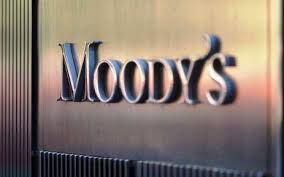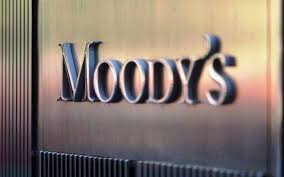
Another credit rating cut for the country is possible down the road unless it gets its ballooning credit in check, officials at Moody's said as China's structural reforms will slow the pace of its debt build-up but will not be enough to arrest it.
Saying it expects the financial strength of the world's second-largest economy to erode in coming years as growth slows and debt continues to mount, the comments came two days after Moody's downgraded China's sovereign ratings by one notch to A1.
Its outlook on China was also changed from "negative" to "stable", suggesting no further ratings changes for some time, by Moody's Investors Service in announcing the downgrade.
Asserting it was based on "inappropriate methodology", exaggerating difficulties facing the economy and underestimating the government's reform efforts, China has strongly criticized the downgrade.
The "vast reform agenda" undertaken by the Chinese authorities to contain risks from the rapid rise in debt, has encouraged the rating agency, senior Moody's official Marie Diron said in response.
Diron said that the reforms will not be enough to arrest the trend and levels will not drop dramatically even while Moody's believes that they may slow the pace at which debt is rising.
Diron expects Beijing will continue to rely on pump-priming to meet its official economic growth targets, adding to the debt overhang and said China's economic recovery since late last year was mainly thanks to policy stimulus.
Diron, associate managing director of Moody's Sovereign Risk Group, told reporters in a webcast that the actual implementation of some of the announced measures, such as reining in local government finances, was being awaited to be seen by Moody's.
Li Xiujun, vice president of credit strategy and standards at the ratings agency, said in the same webcast that if there are signs that debt is growing at a pace that exceeds Moody's expectations, China may no longer get an A1 rating.
"If in the future China's structural reforms can prevent its leverage from rising more effectively without increasing risks in the banking and shadow banking sector, then it will have a positive impact on China's rating," Li said.
But Li added: "If there are signs that China's debt will keep rising and the rate of growth is beyond our expectations, leading to serious capital misallocation, then it will continue to weigh on economic growth in the medium term and impact the sovereign rating negatively."
"China may no longer suit the requirement of A1 rating."
Neither a timeframe for further assessments nor a specific target for debt levels was given by Li.
And its difficulty of reducing debt would be compounding as, from 6.7 percent last year, China's growth to slow to around 5 percent in coming years, Moody's expects. But the likelihood of a hard landing is slim and the economy will remain robust, Diron said.
With Standard & Poor's still one notch above, with a negative outlook, after Moody's downgrade, its rating for China is on the same level as that on Fitch Ratings.
It is maintaining its A+ rating, Fitch said on Friday. China’s growth "has been accompanied by a build-up of imbalances and vulnerabilities that poses risks to its basic economic and financial stability", said Andrew Fennel, Fitch’s direct of sovereign ratings, and noted that China's "strong macroeconomic track record".
Runaway credit growth has created a mountain of debt in China - now at nearly 300 percent of gross domestic product (GDP) even as government-led stimulus has been a major driver of China's economic growth over recent years.
Noting much of the debt and the banking system is controlled by the central government, some analysts are more worried about the speed at which the debt has accumulated than its absolute level.
(Source:www.reuetrs.com)
Saying it expects the financial strength of the world's second-largest economy to erode in coming years as growth slows and debt continues to mount, the comments came two days after Moody's downgraded China's sovereign ratings by one notch to A1.
Its outlook on China was also changed from "negative" to "stable", suggesting no further ratings changes for some time, by Moody's Investors Service in announcing the downgrade.
Asserting it was based on "inappropriate methodology", exaggerating difficulties facing the economy and underestimating the government's reform efforts, China has strongly criticized the downgrade.
The "vast reform agenda" undertaken by the Chinese authorities to contain risks from the rapid rise in debt, has encouraged the rating agency, senior Moody's official Marie Diron said in response.
Diron said that the reforms will not be enough to arrest the trend and levels will not drop dramatically even while Moody's believes that they may slow the pace at which debt is rising.
Diron expects Beijing will continue to rely on pump-priming to meet its official economic growth targets, adding to the debt overhang and said China's economic recovery since late last year was mainly thanks to policy stimulus.
Diron, associate managing director of Moody's Sovereign Risk Group, told reporters in a webcast that the actual implementation of some of the announced measures, such as reining in local government finances, was being awaited to be seen by Moody's.
Li Xiujun, vice president of credit strategy and standards at the ratings agency, said in the same webcast that if there are signs that debt is growing at a pace that exceeds Moody's expectations, China may no longer get an A1 rating.
"If in the future China's structural reforms can prevent its leverage from rising more effectively without increasing risks in the banking and shadow banking sector, then it will have a positive impact on China's rating," Li said.
But Li added: "If there are signs that China's debt will keep rising and the rate of growth is beyond our expectations, leading to serious capital misallocation, then it will continue to weigh on economic growth in the medium term and impact the sovereign rating negatively."
"China may no longer suit the requirement of A1 rating."
Neither a timeframe for further assessments nor a specific target for debt levels was given by Li.
And its difficulty of reducing debt would be compounding as, from 6.7 percent last year, China's growth to slow to around 5 percent in coming years, Moody's expects. But the likelihood of a hard landing is slim and the economy will remain robust, Diron said.
With Standard & Poor's still one notch above, with a negative outlook, after Moody's downgrade, its rating for China is on the same level as that on Fitch Ratings.
It is maintaining its A+ rating, Fitch said on Friday. China’s growth "has been accompanied by a build-up of imbalances and vulnerabilities that poses risks to its basic economic and financial stability", said Andrew Fennel, Fitch’s direct of sovereign ratings, and noted that China's "strong macroeconomic track record".
Runaway credit growth has created a mountain of debt in China - now at nearly 300 percent of gross domestic product (GDP) even as government-led stimulus has been a major driver of China's economic growth over recent years.
Noting much of the debt and the banking system is controlled by the central government, some analysts are more worried about the speed at which the debt has accumulated than its absolute level.
(Source:www.reuetrs.com)














